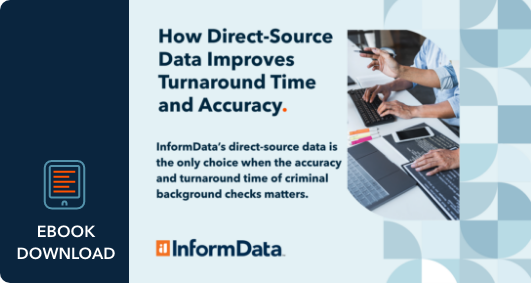Let’s talk about people.
We humans, for better or for worse, are a flawed species. We make mistakes. We get tired and distracted. We can easily find ourselves out of our depth. And sometimes, we, for whatever reason, cut corners and don’t always follow the proper steps to a process.
Generally speaking, the fewer human beings who touch a repeatable process, the more accurately, efficiently, and with a higher standard of quality, a job will get done. It is no secret that the fewer individuals involved in any process equals fewer opportunities for human error.
Of course, there are plenty of exceptions to this rule. Humans coming together to apply their collective expertise and experience can accomplish great things. But efficiently and accurately performing a criminal background check may not always be one of those things.
Getting you close to the data
At InformData, we developed a three-tiered approach to criminal records research around the idea that reducing as many humans as possible from the criminal background screening workflow is a good thing.
Our mission is to get Consumer Reporting Agencies (CRAs) as close to the original data sources as possible. By that, we mean breaking down barriers that only serve to delay results and muddy them with errors.
(Why does this matter? Read our breakdown of the five performance characteristics end-users demand from employment background screening companies: accuracy, turnaround time, customization, transparency, and cost-effectiveness.)
One of the three pillars of our system removes humans from the equation altogether. At this level, our state-of-the-art criminal background screening automation software “scrapes” court websites for conviction records, delivering flawless results nearly instantaneously.
You just can’t get any closer to the data than our automated system without going to the courthouses yourself. Our philosophy is, if it can be automated, it should be automated.
But not every online source of criminal records is up to our high standards for automation. Plus, some courts have yet to put their records online.
As of this writing, we can complete about 62% of our criminal record searches through automation — although we expect that percentage to climb as we optimize our system and courts modernize over the coming years.
Which brings us back to talking about people.
When you do need people, get the best people
To help fill in the gaps that can’t currently be covered through automation, we have assembled a network of full-time trained researchers who work exclusively for InformData.
We place our proprietary research teams strategically, starting with the most densely-populated metropolitan areas. This way, we can derive 90% of the data used for criminal background reports through internal processes.
What does it take to be an InformData proprietary researcher?
As we pointed out above, humans can make mistakes. But the answer is not to give up on human researchers entirely.
Instead, we endeavor to identify candidates for our research network who are meticulous and responsible (military spouses, for example). And then, we put them through a rigorous researcher certification program that includes classroom and on-the-job training.
How do we maintain quality control throughout our proprietary research network?
Our high standards for our researchers do not end there. We expect our proprietary researchers to achieve an accuracy rate of 99.95% — and we know how to help them get and stay there.
The members of our research network are salaried “W2” employees. Thus, we can monitor their performance and work directly with our researchers and their supervisors to maintain and improve key metrics such as turnaround time and accuracy.
Backing up our employees is our in-house search management and reporting tool (SMART). The SMART software (which we developed with significant input from our most experienced researchers) includes powerful error-proofing mechanisms that ensure the data's integrity and quality.
For example, if a disposition date comes before the file date in a criminal records report, the SMART system will red flag the occurrence as a potential quality issue.
How is our proprietary research network different?
Most other criminal background data providers employ very few — if any — full-time researchers. Instead, they pay local, regional, or national third parties to conduct the research on their behalf.
There are some excellent third-party criminal background research firms out there in America. There are even a few that are up to our high standards for reliability, responsiveness, and professionalism. This is how we offer coverage in remote, less-populated areas where it would be impractical to assign proprietary teams.
But relying entirely on third parties requires ceding control to organizations with different priorities, processes, and values than our company, and that’s not acceptable to us.
By contrast, our proprietary research network gives us complete control:
- Our work takes priority with our proprietary researchers — because they have no other work. Our researchers never get bogged down with other clients.
- We can communicate directly with our researchers to resolve issues. At InformData, we connect with the members of our proprietary research network daily.
- Our researchers allow us to accommodate all kinds of customization requests. If you want certain misdemeanors weeded out, we can handle that. A non-standard reporting format? No problem.
Learn how getting close to the data with InformData’s proprietary research network and cutting-edge automated background screening solution can help your agency profit and grow in the highly competitive criminal background screening industry in our ebook How Direct-Source Data Improves Turnaround Time and Accuracy.


